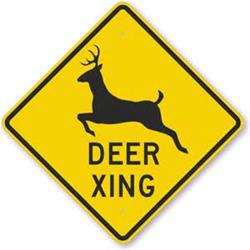Deer-breeding season means more deer on the move

During the fall, motorists are reminded to watch for deer along roadways. Most deer-vehicle collision occur between October and December, during the deer-breeding season. This is when juvenile animals are dispersing from their home ranges. In Anderson Township, over 40% of the 43 reported deer strike accidents reported in the last year occurred during October and November.
According to data from the Ohio Department of Public Safety and Ohio Department of Natural Resources, peak hours for these collisions are the hours prior to dawn and dusk (typically 6am-7am and 6pm-7pm).
Motorists are advised to slow down and exercise caution to reduce the likelihood of encounters with deer along roadways, and to be aware of warning signs signaling deer are in the area. When you see one deer cross the road, look for a second or third deer to follow, as deer typically travel in family groups.
Deer-vehicle accidents are at times unavoidable; however, a few precautions can minimize chances of injury or property damage in a deer-vehicle crash.
• Always wear your seat belt.
• Don’t swerve or drive into something else to avoid hitting a deer – often times this creates an even greater risk of injury. Try to brake as much as possible and stay on the roadway.
• If you spot deer ahead, slow down immediately and honk your horn.